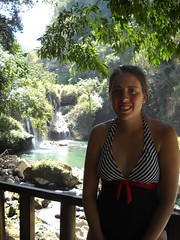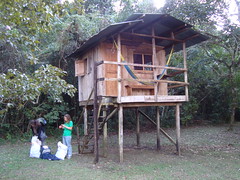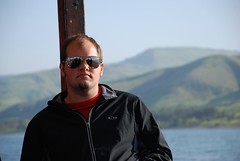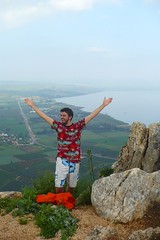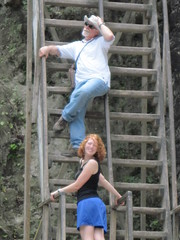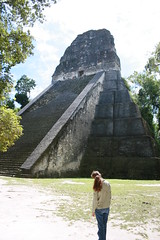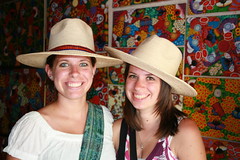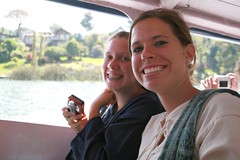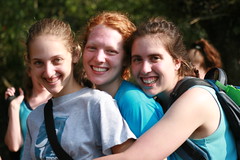For the week of free travel, four of us (Drew, Nathan, Lucas, and I) chose a low-cost, high-endurance option: borrowing a tent and sleeping bags from JUC, writing down the names and numbers of “trail angels,” buying some dried fruit, peanut butter, and cereal in Jerusalem’s Old City, and hiking a roughly 120 km portion of the Israel National Trail (INT) from the Mediterranean Sea to the Kinneret (Sea of Galilee). Everything went mostly as planned despite our unhelpful touring map that contributed to losing the trail on multiple occasions and misjudging the distance we had travelled (and had yet to travel).
“Trail angels” are people along the INT who open their homes to hikers who call a day or two in advance. This proved to be one of the highlights of our experience: we stayed in our tent for four nights, and stayed in peoples’ houses for three. We met many interesting people –including at least two men who fought in the ’73 Yom Kippur War. One of these men’s parents met in a concentration camp after their previous spouses and children had been killed (“I owe my existence to Hitler,” Miki the veterinarian said). The other man, Noam, was a former IDF officer who served as a military attaché to a high-level NATO official in the Netherlands for seven years. I spent over an hour talking with Jehudit on our last night of free travel while she prepared dinner for us.
We learned about the distinctiveness of the Bedouin population within Israel and their reluctance to identify with the broader Arab minority when we departed from the trail for a day and instead walked through Shibli, a Bedouin town near Nazareth. Several men running a shop along the road stopped us to offer water, chairs, coffee, and eventually a ride partway to our destination. In another circumstance, an Arab-Israeli family in Kabbiya gave us four full bottles of cold water when we came to their town and offered us a place to stay at their home.
There were a few hitches in our hiking — not only the “lost” variety, but also the “ride in a car” variety. We found that hitchhiking was fairly easy despite our four large hiking packs. We were picked up by a wide range of people: Shalam, a young religious Jew who spoke almost no English; Akram, a Bedouin who also spoke almost no English; two Israeli soldiers fluent in English on a weekend trip to Tiberias, and Zaer, an elderly Israeli Jew who kindly took us to the top of Mt Tabor so we could see the church… and then merrily waved and drove away, leaving us farther back than we had been 24 hours before.
It was a good set of experiences, a good way to see and meet a variety of Israel’s geography and people, and of course, extremely physically strenuous and rewarding (our longest day of hiking was at least 30 kilometers). In all, it was an amazing cross section of Israeli society that we had yet to see in any of our group travel and learning.
Kaitlin Heatwole
Whenever you start out on a trip with a small budget, a friend, small backpack, and no guarantee that you will even reach your destination, you know that you are in for a great adventure. That is how my free travel week with Larisa started out. Our destinations were Beirut, Lebanon and eventually Damascus, Syria. No EMU student has ever gone to Syria for free travel before. Since Lebanon and Syria don’t allow people that have been to Israel to enter and Syria makes it difficult for United States citizens to enter, we had no guarantee that we would get in when we bought our plane tickets from Amman to Beirut. We had been careful to keep our passports clean and hide all traces of having been in Israel, but one wrong stamp at the Jordan river crossing and we would have to scratch our plans. Since so much was up in the air we made reservations for one night in Beirut and nothing else.
We left JUC around ten on Sunday morning with David and Rebekka, bound for the Sheik Hussein bridge. After spending a large portion of our budget on transportation, one exorbitant exit fee, and visas, we arrived in Beirut, Lebanon at our hotel around nine at night. The people at our hotel heard that we wanted to go to Syria and laughed as they said good luck. Early Monday morning we set out for the bus station, bought tickets, bought zaitar bread for breakfast, and boarded our bus to Syria. After about two hours, we arrived at the border and said goodbye to the bus as we prepared for a long wait with books at hand. Five and a half hours later we got the good news that we had permission to enter Syria! This was the beginning of an amazing three days in the Old City of Damascus.
The Old City of Damascus is without a doubt my favorite place in the Middle east. Tourism is not as common so the culture has not been adversely impacted like many cities in Egypt. Food and lodging were ridiculously cheap, a massive market that put any North American store to shame, and friendly people provided for a unique experiance. Words are worthless in describing the souq (market). Just try to imagine a clean, old market with hundreds of large sacks full of every spice imaginable, coffee, dates, dried fruit, coconut, and tea. Shops overflowed with textiles from every corner of the world, clothing, kitchen products, antiques, metal ware, and anything else that you could ever want or need. No need to buy here, the sensory overload was enough to let one standing in a state of shock unable to take it all in. To make it better, for the first time on the trip we could walk down a street without being hassled by a shop keeper. Some of the things that you could find included damask tablecloths from Damascus of course, handmade wool rugs from Iran, paintings from Iraq, saffron from Vietnam, coffee from Brazil, and antiques from the Ottoman era. It brought the spice and silk trade of the history books to life.
If the sights of the market were not enough to fill our time, there was the Omayyad mosque to visit. It is the third or fourth most important mosque in Islam and the most important one that westerners can visit. The mosque houses a shrine to John the Baptist and the supposed location of Jesus’s return, according to Muslims there. Larisa and I spent most of a morning here and found it interesting to see pilgrims from all over the Middle East including Iran. During the call to prayer, we got a free laugh as the singer stopped to cough! It provided an insight into the diversity of Muslims. Our brief time in Damascus also provided opportunities for great conversations with locals, meeting with Mennonite connections, and walking down straight street (think Saul or Paul). As the time came for us to return to Beirut on Wednesday afternoon, Larisa and I found it to be a bit bittersweet as we found ourselves longing to return.
Back in Lebanon, we spent a day enjoying the corniche and pigeon rock along the Mediterranean coast of Beirut and another day enjoying the coast of Tyre in the South. Lebanon has not known much peace over the last two decades. This was especially evident in the south as we saw Hezbollah posters, bombed out buildings and dozens of UN peacekeeping troops. Both Syria and Lebanon are home to hundreds of thousands of Palestinian refugees and Iraqi refugees. This has destabilized both countries and added numerous challenges. Syria alone has had 20% inflation each year for the past two years. Now, why would they be upset with the United States foreign policy? While, I don’t endorse either government, the experiences I had in both countries reinforced the need to solve the Palestinian and Israeli conflict in addition to ending the war in Iraq. This was a wonderful learning experience and I find myself a bit envious of any future EMU student that gets to study in Syria.
-Chrissy Krieder

